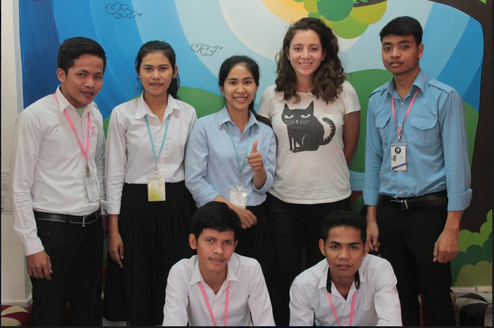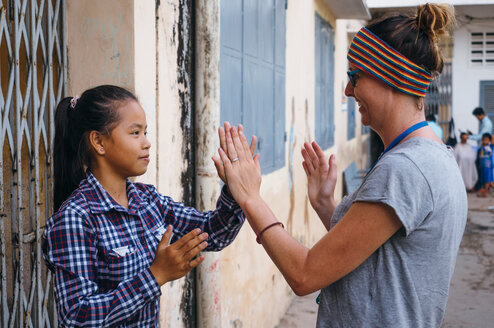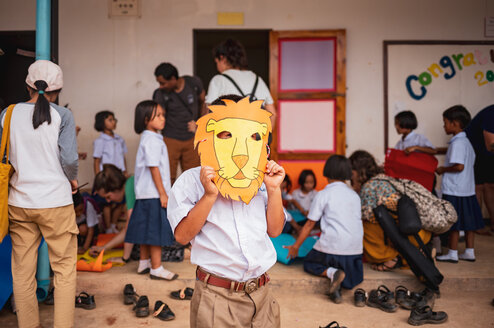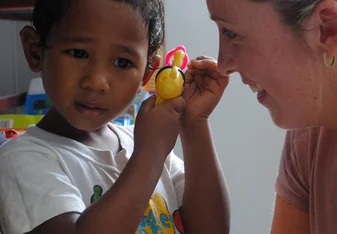Teach English in Cambodia
Teaching Programs in Cambodia
Guide to teaching English in Cambodia
Cambodia is famous for its rich history, impressive temples, and stunning beaches. Teaching in Cambodia is a great way to experience a new culture, make some money, and meet people who love to learn. So if you're looking for an adventure, look no further than teaching English as a second language (ESL) abroad in Cambodia!
Compared to other countries, the qualifications required to obtain a teaching job in Cambodia are minimal! You just need to be a native English speaker, hold a bachelor's degree, and have one year of teaching experience, making it easy to get started on your ESL journey.
Interested in teaching English in Cambodia? We’ve got you covered! Keep reading to learn more about the types of teaching jobs, average salaries and benefits, and how to get a teaching job in Cambodia!
Types of teaching jobs in Cambodia
There are many different types of teaching jobs in Cambodia. Many opportunities are available, whether you’re looking to volunteer for a month, work on the ground with NGOs, or teach long-term in a private school.
Private schools
Public schools rarely hire foreign teachers, so most ESL teachers are employed at the abundant private schools around Phnom Penh. Teachers may begin teaching classrooms starting at the preschool level up to adults in university. (18 to older adults).
Your work schedule can vary depending on when you want to teach and what age level.
Positions for teaching English classes for adults generally meet at night, starting around 5:30pm to 7:30pm, when people finish their workday. In contrast, primary and secondary schools meet from 8am to 11am, then again from 2pm to 5pm, with a lunch break in the middle.
Volunteer teaching
Volunteering to teach English in Cambodia is a great way to travel the world and do good simultaneously. The country has high unemployment rates, and English speaking skills are highly valued, so many organizations look to volunteers for additional help.
You can also find volunteer programs to teach at orphanages (though it’s important to consider the ethicality of the program and do your research first!) or work with Buddhist monks. Teaching English in Cambodia as a volunteer can be a rewarding and unforgettable experience.
Average salary and benefits for teaching English in Cambodia
On average, an English teacher's monthly wage in Cambodia is between $1,000-$1,600USD. While this may not seem like a high salary, it's enough to live comfortably, especially since teachers typically receive accessible accommodations and work only three or four days per week.
Common benefits included for teachers
Your employer will likely provide health insurance and retirement benefits. Some schools allow teachers to bring spouses along with them.
Read more: How Much Money Can You Save Teaching Abroad?
Cost of living in Cambodia
If you're looking for a budget-friendly adventure, Cambodia is your place. Overall, the cost of living is incredibly accessible, especially if you're willing to live in one of the more affordable areas outside of the capital city. Expect to budget for $500-$900 each month for expenses, depending on the lifestyle and area you live in.
- Food: $80-$200 USD/month
- Transportation: $28 USD/month (monthly public transportation pass)
- Entertainment (movies, bars/clubs, etc.): $27 USD/month
- Housing: $243 - $518 USD/month (1 bedroom apartment in the city center)
Source: Numbeo
Where and how to find housing
The school that you work for should be able to help with finding accommodation. Some schools will provide housing, or you may be able to negotiate a room at a nearby guesthouse. You can also look for apartments on the websites of local real estate agents.
When searching for an apartment to rent in Cambodia, it is important that you consider how much space and comfort you need and your budget. The most expensive areas tend to be Phnom Penh and Siem Reap, while Battambang has some more affordable options. However, if money is not an issue, then there are many different types of apartments available throughout these cities, ranging from small studio flats to large family homes - all with great amenities like internet access!
Read more: What Salary Will You Earn Teaching Abroad in Cambodia?
Where to teach English in Cambodia
As with starting a job in any new country, it's important to do your research before coming to Cambodia. Start by exploring these major teaching cities in Cambodia:
Phnom Penh
Phnom Penh is the capital city with over one and a half million people, and it is also home to some of the best schools in Cambodia. The cost of living is higher here, but so are wages offered by employers as well as opportunities for professional development like ESL classes or TEFL certification courses paid for by employers. Phnom Penh will be right up your alley if you like working in big cities!
Siem Reap
Siem Reap is a great place to teach English. The city is just a couple of hours drive north of the ancient temples at Angkor and has become a popular tourist destination in its own right. It is also an excellent base for exploring other parts of Cambodia and Thailand, Vietnam, and Laos.
If you’re planning on teaching English in Cambodia, then Siem Reap should be high on your list of possible destinations due to its proximity to the Angkor temples and its popularity with tourists. With over 300,000 people, Siem Reap is more prominent than many other towns or cities in Cambodia. In addition, most of those who live here are employed by tourism businesses like hotels, restaurants, and bars.
How to get a job teaching English in Cambodia
Where to find jobs
There are a few different ways to find teaching jobs in Cambodia. You can view available job listings on the Go Overseas teaching jobs board. You can also take a look at the third party companies right here on our site and read verified community reviews! These programs will assist you with the application process, match you with a school, help you secure your visa, and more.
Another great way to find jobs is to visit the school website of an organization that interests you and sees whether they list any open positions or upcoming training and workshops on their events page. If not, send them an email asking if they have any openings or if they know anyone who does.
Recruitment agencies working with schools or local companies who want to hire foreign teachers may also be able to help connect you with work opportunities so double-check those as well.
When to apply
South East Asia is known for its love of holiday celebrations. However, with many schools taking significant breaks to celebrate, it can be difficult to start teaching or applying for jobs. Schools are in session all year and vary their term dates, but there are long and frequent breaks during the winter holidays, from December until February and again in May.
For this reason, the capital city of Phnom Penh is one of the only places in Cambodia to find a reliable job. Unfortunately, once the rainy season hits, there is little-to-no work in the provinces unless you volunteer, and Siem Reap and Sihanoukville don’t offer much availability for new teachers.
Qualifications needed
Due to their overwhelming need for teachers, the qualifications for teaching positions are minimal compared to other teaching destinations. As a result, many schools will accept high school or graduate-level employees.
However, university positions generally require at least a bachelor’s degree. Unlike many neighboring countries, you do not need a hard copy of any diploma, nor is it necessary to be TEFL/TESOL/CELTA certified. However, as in any job market, the better your resume, the better your odds of finding more jobs, so having these qualifications can only help you get higher salaries and preferred hours.
You currently do not need a criminal background check before applying for jobs, but many schools advise that you get one before leaving your country of origin. (In case of these policy changes, it is difficult to obtain one while abroad.)
Read more: What are the Requirements to Teach English Abroad?
Work visa
When you arrive in Cambodia, you can apply for and receive a tourist visa, which will allow you to stay in the country for 30 days. If you want to teach, you will also need to obtain a business visa, which you can renew from within the country. You must leave and re-enter the country with a tourist visa to renew it.
To avoid confusion, know that the business visa is also your working visa. After 30 days, you can apply for work visas for one month, three months, six months, or one year.
What’s it like to live & teach English in Cambodia
As an ESL teacher abroad, it’s essential that you take the time to research the country’s etiquette and classroom culture, as it can be vastly different from what you’re used to at home! ESL teachers should be respectful and understanding while adapting to a new classroom environment.
Classroom & work culture
Teaching English in Cambodia is a unique experience. The classroom culture is very different from what you might be used to, and you will have to adjust your teaching style accordingly. In the Cambodian classroom:
- Teachers are often addressed as "Mr" or "Miss" instead of by their first names (or nicknames).
- Punctuality is essential, teachers need to arrive on time and start class on time. Likewise, students need to arrive at least 5 minutes early to get their materials ready before class starts. If there's an emergency and you have a late arrival, make sure that you inform your students so they can plan accordingly.
- Many people pick their noses in public. Your students will too.
Culture & etiquette tips
Cambodia is a conservative country with strong traditional values reflected in its culture.
- Always dress professionally: You should know that modesty is important when dressing for the classroom and going out on the town. Men should avoid shorts, tank tops, and flip-flops, and women should cover their shoulders with a scarf or shawl.
- Showing respect: Bow when entering temples or palace buildings, remove shoes before entering homes, do not sit with your feet pointing towards a Buddha statue/image, and avoid touching monks' robes while visiting monasteries.
- Avoid using the left hand: To pass or receive items, the right hand is used. Sometimes both hands are used. The left hand is considered impolite and should not be used.
- Do not step over anything: Your feet are believed to be the dirtiest part of your body, and it is insulting to lift them over someone’s bag or chair.
- The top of the head: This is considered the most important part of the human body. It is taboo to touch someone on the top of their head, especially a baby or child.
Ready to find your dream teaching program in Cambodia?
Start researching and comparing teaching programs here at Go Overseas in the Teaching Programs in Cambodia section below.
Want to read more? Get started with these articles:
New Teaching Jobs
View the latest teaching job postings on our job board.
Related Teach Abroad Articles
Frequently Asked Questions
-
How much do English teachers earn in Cambodia?
Teachers in Cambodia earn an average of $700-$1,000 a month.
-
Can I teach English in Cambodia without a degree?
Due to a high demand for teachers, qualifications for teaching in Cambodia tend to be rather lax. It's possible to find a teaching job with only a high school diploma, though having a Bachelor's degree or TEFL certificate will make you a more competitive candidate and could make you eligible for positions at universities.
-
How can I teach English in Cambodia?
Cambodia is a great destination to teach abroad because it's relatively easy to find jobs and the salary will be more than enough with which to explore the country. There are a number of organizations that offer teaching programs such as LanguageCorps, Destination TEFL, and Learning Jungle International School. You can apply through a third-party provider that will match you with a teaching job or you can apply to jobs directly by searching job boards or looking at availability in international schools.





































